 Michael Clawson’s Best Films of 2014
Michael Clawson’s Best Films of 2014
I’ll admit that 10 is a better number than 15, especially when the 15 has an asterisk, footnote and appendix. But choosing only 10 top movies of 2014 is just too difficult, and the end result is too neat and tidy. And if a year has more than 10 great movies, then why limit a list that is a reflection on that year?
So yeah, here’s my top 15 movies of the year, which is actually more like my top 16 since one entry has two movies. And then there are two honorable mentions, and a four-movie note about this year’s franchise movies. It’s not as neat as 10, but it’ll do.
15- Cold in July
I had given up on Cold in July, and then it impressed the hell out of me. Jim Mickle’s crime thriller starts with a husband and father killing a burglar in his living room. Then the burglar’s nutty father starts terrorizing the family. Notes of Cape Fear start trickling onto the screen just before you start zoning out. But then — BAM! — Cold in July turns into something else entirely. The film is anchored by strong performances from Michael C. Hall, Sam Shepard and Don Johnson as a tough-talkin’ private detective. This movie came out to little fanfare, but I hope viewers discover it.
14- Edge of Tomorrow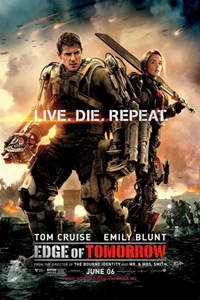
“Tom Cruise in a mech-suit doing Groundhog’s Day with alien time-shifters.” If that was the pitch that got this movie the green light, then bravo to the poor soul who had to look a studio executive in the eye and pitch it. Doug Liman’s mind-bending sci-fi shooter is silly and stupid at times, but then it also has an inventive streak that pushes this past mediocrity and into something special. The movie came out in June, but it is still getting thoughtful plot dissection from trip’d-out fans six months later, even after the film was re-branded for DVD and Blu-ray as Live. Die. Repeat. The film reaffirms an old myth: Tom Cruise is always better in science fiction.
13- Gone Girl
David Fincher’s who-dun-it shows the veteran director at his very best. Rarely is a director in perfect synchronization with his editor, cinematographer, screenwriter and cast with such outstanding and fluid results. The film, based on Gillian Flynn’s novel of the same name (she also wrote the screenplay), features Ben Affleck as a husband accused of murdering his seemingly flawless wife, played with a frosty chill by Rosamund Pike. As the mystery unfolds, it’s clear that there are larger things at play, and it’s in these scenes that Fincher really digs in. What could have fallen apart only gets stronger as Flynn’s characters paint themselves into the same corner. Fincher handles it all with exquisite class, proving that he’s earned his spot as one of Hollywood’s elite directors.
Honorable Mention: Chef — I left Chef feeling very hungry. It’s about a disgraced cook who takes his trade mobile with a food truck. Along for the ride is his line cook, his son and a growing army of loyal followers. The film is written, directed and stars Jon Favreau, and also features John Leguizamo, Scarlett Johansson, Dustin Hoffman and many others. The jokes are great, the food looks delicious, the locations are warm and inviting … something tells me that everyone had a great deal of fun making this movie. And it shows, because it’s a lot of fun to watch.
 12- Force Majeure
12- Force Majeure
During an afternoon ski outing, a family is nearly overtaken by an avalanche. The mother instinctively reaches for her kids, but the husband runs off with nothing in his hands but his cell phone. During the rest of the ski trip this family is torn apart by the repercussions of the avalanche and what it revealed within the father’s personality. Ruben Östlund’s tightly wound relationship drama is mostly a series of conversation separated by interesting shots of a ski resort coming to life each morning and then resetting at night. It ends with a revelation that changes much of what we just saw, but Östlund is so delicate with the handling of it that the twist is barely noticeable. This Swedish film is a remarkable examination of the nature of married couples, and the way they spool their lives around each other in opposite directions.
11- A Most Violent Year
A Most Violent Year is about a man taking every precaution to do the right thing, even as he edges closer to that which he fears — corruption, crime and violence. J.C. Chandor directs Oscar Isaac and Jessica Chastain in this gloriously photographed crime drama about a heating oil company trying to expand in New York City. The film has a Godfather vibe, from Isaac’s stone-cold Michael Corleone performance to the warmly lit interiors that act as characters to the film’s carefully written criminal underbelly. The movie took me places I wasn’t expecting, and the ending is underplayed until you stand back and appreciate it for what it says about business, crime, and the intersection where the two often meet.
 10- Dom Hemingway
10- Dom Hemingway
While all eyes are on Michael Keaton’s Birdman performance, I just can’t ignore Jude Law’s gonzo turn as the title character in Richard Shepard’s irreverent crime drama Dom Hemingway, about a man who gets out of prison and slowly unravels amid heists, dinner parties, hooker orgies and a car crash frozen in a tableau of flailing arms and legs. Dom is a vile rascal, but he’s kinda lovable, especially when paired with the great Richard E. Grant as his sidekick. The film has one of the best cold opens of the year, and it deserves to be on every Jude Law highlight reel from here to eternity.
9- The LEGO Movie and Big Hero 6
Besides both being wonderfully animated and perfectly paced family films, the reason these two animated gems are both on this list is the message they send to their younger audiences: The LEGO Movie encouraged youngsters to create and play outside of the rigid structures of life, and Big Hero 6 emphasized science and math as career paths. These ideas weren’t just preachy codas tacked onto each film’s endings; they are ingrained in their respective plots. Long ago kids movies were filled with farts, boogers and groin kicks, but these days they have more to say, even amid forgivable product placement and superhero formulas.
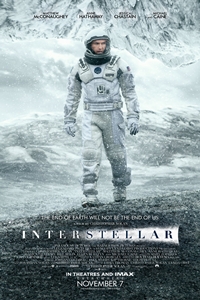 8- Interstellar
8- Interstellar
Christopher Nolan’s epic sci-fi tale is less movie and more sound-and-light show. Featuring the science of wormholes, Einstein’s Theory of Relativity, time travel, black holes and what can only be described as the control room of the universe, Interstellar’s reach for the stars is beyond ambitious, and Nolan mostly pulls it off aside for some sloppy editing and plot holes, which are forgiven considering the film’s scope across the galaxy. It really becomes something special when Hans Zimmer’s booming score rattles from the screen. Theater owners reported receiving complaints about the film’s volume, but loud and proud was the way it should have been shown.
7- Birdman
Michael Keaton’s brave performance in Birdman as a washed-up actor on Broadway has made him a frontrunner in the Oscar race, a race he will likely win. But more than that, the performance in Alejandro González Iñárritu’s whirlwind of a movie has reminded us all how great Keaton is, and always has been. He’s a singular force in Birdman, in which he staggers and grumbles through a New York City theater where he’s staging a Raymond Carver play that has shades of his own life in it. The editing is all very slick, and the camera work is virtuosic, but mostly this is an actor’s movie, with Keaton, Naomi Watts, Edward Norton, Emma Stone and many others.
6- Ida
Pawell Pawlikowski’s gorgeously photographed character study takes place in 1960s Poland as a nun traces the footsteps of her parents, who were likely killed during the Nazi occupation or the years following World War II. The nun (played exceptionally by Agata Trzebuchowska), with warm eyes and skin the smoothness of elegant porcelain, is immediately out of place as she treks through small Polish villages as she ponders her mysterious past and her convent future. The film is shot in black and white, and it’s just perfect cinematography, with characters shot in poetically odd framings, natural light pouring through windows and mesmerizing compositions. No movie this year was photographed better.
5- Under the Skin
Nothing quite prepares you for Jonathan Glazer’s art-house sci-fi flick Under the Skin, featuring a steely-cold Scarlett Johansson as an alien viper luring unsuspecting men to their doom in an inky black goo that liquefies everything under their skin. It may sound like Aliens, but it’s miles away from an action movie as its ethereal mood and tone allow for hypnotically staged sequences of Johansson pretending to be an alien pretending to be a human. It’s all rather wacky and cerebral, but also oddly mesmerizing.
4- Life Itself
When Roger Ebert passed away in 2013, he wasn’t just the world’s most famous movie critic, he was also one of the most treasured. His reviews exposed hard truths about the films, about himself, and about all of us. They were reflections of who we as a people were, are and will be. They were also quite funny. So when Ebert lost the ability to speak amid a cancer diagnosis, his readers were afraid he would be silenced up on that balcony set where he gave thumbs up and thumbs down. His voice was silenced, but his keyboard clicked and clacked ever louder as he wrote from Facebook, Twitter and his personal blog. Steve James’ lovely documentary follows Ebert as he writes, heals and eventually passes away unexpectedly. It had a fly-on-the-wall vibe to it as the critic lived his life, but Life Itself also serves as an impromptu biography, with chapters on Gene Siskel, their shared TV show, his wife Chaz, his alcoholism, his upbringing and so much more. By the time Ebert had passed, he was no longer just a film critic; he was our collective voice broadcasting as loud as ever.
3- The Grand Budapest Hotel
Wes Anderson continuously astounds me with his quirky diorama-like presentations. His visual style, developed over an entire career, hasn’t yet hit a dead end as he explores braver plots, more intricately layered stories and growing choruses of characters, sometimes enough to fill a small amphitheater. He really outdoes himself with The Grand Budapest Hotel, loosely starring Ralph Fiennes and about 30 other fine actors. I knew I was in for a ride when the film started with a book, an interview and two sets of flashbacks all nested together. This film’s lo-fi special effects and model miniatures are especially noteworthy for their simplicity and quaintness. Anderson has made eight great films and never repeated himself, and I can’t wait for what’s next.
2- Snowpiercer
Science fiction is supposed to be a little ridiculous and Joon-ho Bong’s Snowpiercer does not let you down in that department. It’s about a train containing all of humanity that circles the globe in order to preserve mankind from a nuclear winter. Yeah, that ridiculous. The action thriller, starring Chris Evans and Tilda Swinton, came out in prime blockbuster season and immediately blew the doors off the summer’s usual fares. With glorious music, clever visual compositions, stupidly fun gun and hatchet fights and absurdly simple science fiction mythology, Snowpiercer is a marriage of great ideas.
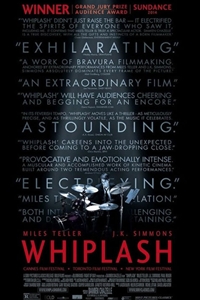 1 – Whiplash
1 – Whiplash
Damien Chazelle’s sensational musical drama Whiplash is about two characters, a hero and a villain, fighting to the same end. It’s only during the last 15 stupendously bonkers minutes do they finally realize they’re on the same trajectory, just shooting from opposing sides. Whiplash knows what it is, where it’s going and how it’s getting there from the very beginning, and it shows in Chezelle’s confident directing and in the determined performances of stars Miles Teller and J.K. Simmons as master and apprentice at a prestigious music school. (This is the second time Teller has topped my year-end movie list; last year he did it in James Ponsoldt’s Spectacular Now.) I never would have thought so much tension, calamity, violence, hatred, obsession and drama could have come from jazz drumming — Whiplash has it all.
Honorable Mention: St. Vincent — Bill Murray, our national treasure, has done it again: he’s out-Murray’d himself. The comedian once again plays a loser schlub in Theodore Melfi’s charming St. Vincent, about a grumpy old man befriending a lonely kid with a working mom. It’s funny, kinda adorable in parts, devastatingly honest and just all-around earnest in its treatment of Murray’s Vincent. It also features Naomi Watts as a Russian prostitute, Chris O’Dowd as a Catholic school teacher, Terrence Howard as a bookie and Melissa McCarthy as the too-busy-for-her-kid mother. All of this might be too much if it weren’t for the central relationship of Vincent and the kid, played expertly by Jaeden Lieberher. They just click together in all the right places.
Some words on franchise movies: There are too many superhero movies and sequels. And each year there are more. This year there were certainly some major duds, including the new Hunger Games movie, the new Spider-Man and the second Captain America movie. If we never discuss them again that will be too soon. But I want to also commend some of these movies that excelled past the genre in which they live. They were inventive, well-paced, marvelously acted (live, animated or by motion capture) and all-around fantastic. If all superhero movies and sequels were this good, I would be a happy camper. The movies that distinguished themselves are X Men: Days of Future Past, Guardians of the Galaxy, Dawn of the Planet of the Apes and How to Train Your Dragon 2. Let’s hope their sequels live up to the hype.
 Winter Sleep
Winter Sleep

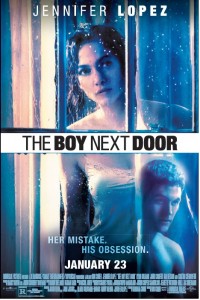 The Boy Next Door
The Boy Next Door
 King of Herrings
Dir: Eddie Jemison and Sean Richardson
King of Herrings
Dir: Eddie Jemison and Sean Richardson interesting quality of identifiable people. The leader with a Napoleon complex, the supportive to a fault friend, the peacemaker who keeps everyone calm, the friend who is waiting to take over, the lonely woman on the verge of self-discovery; these characters are all well rendered here. It’s a compliment to the narrative structure, which moves somewhat aimlessly, that these difficult characters remain believable amidst all the underhandedness that transpires. Though it’s easier to accomplish this when you have such a talented cast. Eddie Jemison is in the spotlight and accomplishes the task of becoming a loathsome character in the first few minutes of screen time. This continues throughout as Ditch vehemently muses on aspects of love, sex, marriage, and friendship. It’s comic yet wholly serious, a thin line that displays Jemison’s skill. Joe Chrest does a great job as The Professor, moving from an insufferable smart aleck, to a revenge-seeking degenerate, to a confused suitor; you never know what aspect of the character is genuine if any at all. The best character in the mix comes along unexpectedly in the form of Laura Lamson who plays Ditch’s wife Mary. Her character is mistreated and degraded by Ditch throughout, relinquished to an almost captive state as a lonely woman desperate for escape and the self-esteem to stand up to her husband. Lamson starts off subdued but slowly emerges as the strongest character amidst a group of men whose misguided masculinity in a way becomes their vulnerable limitation.
interesting quality of identifiable people. The leader with a Napoleon complex, the supportive to a fault friend, the peacemaker who keeps everyone calm, the friend who is waiting to take over, the lonely woman on the verge of self-discovery; these characters are all well rendered here. It’s a compliment to the narrative structure, which moves somewhat aimlessly, that these difficult characters remain believable amidst all the underhandedness that transpires. Though it’s easier to accomplish this when you have such a talented cast. Eddie Jemison is in the spotlight and accomplishes the task of becoming a loathsome character in the first few minutes of screen time. This continues throughout as Ditch vehemently muses on aspects of love, sex, marriage, and friendship. It’s comic yet wholly serious, a thin line that displays Jemison’s skill. Joe Chrest does a great job as The Professor, moving from an insufferable smart aleck, to a revenge-seeking degenerate, to a confused suitor; you never know what aspect of the character is genuine if any at all. The best character in the mix comes along unexpectedly in the form of Laura Lamson who plays Ditch’s wife Mary. Her character is mistreated and degraded by Ditch throughout, relinquished to an almost captive state as a lonely woman desperate for escape and the self-esteem to stand up to her husband. Lamson starts off subdued but slowly emerges as the strongest character amidst a group of men whose misguided masculinity in a way becomes their vulnerable limitation. actress Laura Lamson, the actor-director’s real-life wife. Lamson plays Mary, much-better half to Jemison’s Ditch, the wildly offensive leader to his circle of misfits and miscreants. When Ditch pushes his caustic sense of humor a little too far within the group, The Professor (played by Joe Chrest) plans a retaliatory strike by befriending Mary, Ditch’s lonely seamstress wife.
actress Laura Lamson, the actor-director’s real-life wife. Lamson plays Mary, much-better half to Jemison’s Ditch, the wildly offensive leader to his circle of misfits and miscreants. When Ditch pushes his caustic sense of humor a little too far within the group, The Professor (played by Joe Chrest) plans a retaliatory strike by befriending Mary, Ditch’s lonely seamstress wife. Winner of the Breakthrough Filmmakers Award at the 2014 Phoenix Film Festival, King of Herrings releases this
Winner of the Breakthrough Filmmakers Award at the 2014 Phoenix Film Festival, King of Herrings releases this  and Augie (John Mese). They're a ragtag group of friends that always seem to fight over trivial matters in New Orleans. The catalyst for the story involves a debt of nine dollars that's completely asinine in the grand scheme of things, but to these men means everything. It's a semblance of respect and honor that they cannot seem to fulfill that haunts their decisions and leads to increasingly disrespectful actions: adultery, threatening, violence, and anything else that could possibly destroy friendships. The characters aren't relatable in their actions but in their emotions; I cared for the characters when I could see compassion shining through their tomfoolery. Characters need heart and Jemison's film allows them that, even if there are slight bouts of misogyny that pervade the men's decision-making. King of Herrings meanders in the middle as the characters' actions begin to feel a bit strained, but the conclusion is worthwhile and a reminder that comedies must have notes of tragedy or else, well, what are we laughing at?
and Augie (John Mese). They're a ragtag group of friends that always seem to fight over trivial matters in New Orleans. The catalyst for the story involves a debt of nine dollars that's completely asinine in the grand scheme of things, but to these men means everything. It's a semblance of respect and honor that they cannot seem to fulfill that haunts their decisions and leads to increasingly disrespectful actions: adultery, threatening, violence, and anything else that could possibly destroy friendships. The characters aren't relatable in their actions but in their emotions; I cared for the characters when I could see compassion shining through their tomfoolery. Characters need heart and Jemison's film allows them that, even if there are slight bouts of misogyny that pervade the men's decision-making. King of Herrings meanders in the middle as the characters' actions begin to feel a bit strained, but the conclusion is worthwhile and a reminder that comedies must have notes of tragedy or else, well, what are we laughing at? A Most Violent Year
A Most Violent Year
 American Sniper
American Sniper
 Blackhat
Blackhat
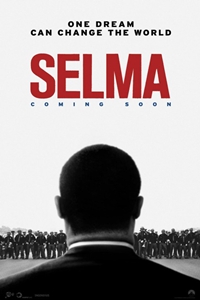 Selma
Selma
 Inherent Vice
Inherent Vice
 Michael Clawson’s Best Films of 2014
Michael Clawson’s Best Films of 2014

 12- Force Majeure
12- Force Majeure 10- Dom Hemingway
10- Dom Hemingway 8- Interstellar
8- Interstellar
 1 – Whiplash
1 – Whiplash Monte Yazzie’s Best Movies of 2014
Monte Yazzie’s Best Movies of 2014

 3 Birdman or (The Unexpected Virtue of Ignorance) (dir: Alejandro González Iñárritu)
3 Birdman or (The Unexpected Virtue of Ignorance) (dir: Alejandro González Iñárritu)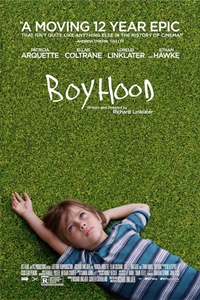
 Eric Forthun’s Best Movies of 2014
Eric Forthun’s Best Movies of 2014
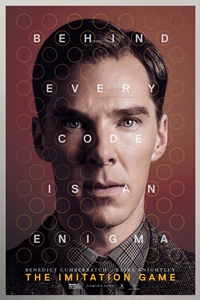
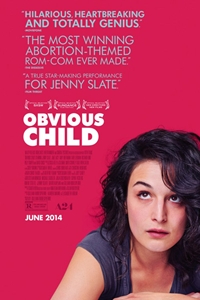 6 - Obvious Child
6 - Obvious Child Unbroken
Unbroken







